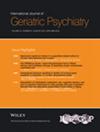Dementia Education and Training for the Multidisciplinary Student Healthcare Workforce: A Systematic Review
Abstract
Objectives
To systematically review research evidence on the effectiveness of dementia education and training for health and social care students.
Methods
We searched electronic databases for primary research studies (published between 2015 and 2024), evaluating dementia training for health and social care students. We assessed risk of bias using the Mixed Methods Appraisal Tool, prioritising studies scoring 4+ (higher quality) that reported significant findings on primary outcomes from controlled intervention trials. We reported outcomes using Kirkpatrick's framework. We consulted professional stakeholders in a focus group regarding how findings might inform practice.
Results
17/35 included studies were rated 4+ on the MMAT; only one met our criteria for priority evidence. An experiential programme for medical students, ‘Time for Dementia’, which combined skill-learning and reflective sessions with visits to people with dementia, was found to improve Kirkpatrick Level 2 (learning) outcomes, attitudes and knowledge over 2 years of participation; this was supported from findings from qualitative studies. Asynchronous, self-directed learning did not improve learning outcomes, relative to standard training. Though almost all training programmes incorporated lived experience, no patient reported outcomes were used to evaluate the impact of training. Nine focus group attendees agreed that the evidence reflected their experiences that consistent support, combined with skills-based and reflective sessions, optimised student learning from initial patient-focused encounters.
Conclusions
Effective interventions increased confidence and enjoyment of dementia care encounters, and increased interest in careers in dementia specialities. Mandating evidence-based dementia skills programmes across specialities could ensure that students learn the skills and competencies required to be part of an effective future workforce and drive important improvements in care quality. Evidence based approaches to enhancing dementia education in training could include experiential learning modules in early years of medical school training and allied health and care professional training, using evidence-based approaches to teach communication skills and other essential dementia care skills within clinical placements, and providing dedicated supervision to support their implementation. Future research could usefully consider patient perspectives in determining the impact of educational programmes.


 求助内容:
求助内容: 应助结果提醒方式:
应助结果提醒方式:


